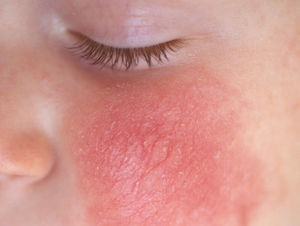Researchers in Walsall sign up first UK patient to eczema trial
Researchers in Walsall have recruited the first patient in the UK to take part in a clinical trial to investigate a new drug to treat adults with severe eczema.

The global Phase II dermatology clinical trial LP0145-2240, sponsored by Leo Pharma, is looking at a novel drug LEO 138559 in the treatment of moderate to severe atopic dermatitis.
“Atopic” means sensitivity to allergens.
It can run in families, and often develops alongside other conditions, such as asthma and hay fever.
The symptoms of atopic eczema often have certain triggers, such as soaps, detergents, stress and the weather.
Dr James Halpern, consultant dermatologist at Walsall Healthcare NHS Trust, is principal investigator on the study with Jo Butler as research nurse.
Dr Halpern said: “We are really proud to have recruited the first patient in the UK to this exciting phase II commercial clinical trial.
“The novel medication being researched is potentially highly effective in the treatment for adults with severe eczema which is a debilitating condition for sufferers and has a significant impact on their day to day lives.
"The dermatology department at the trust has a substantial research portfolio, allowing our patients to access new and developing treatments. Our success in previous clinical trials has led to major pharmaceutical companies actively seeking to work with us and delivering huge benefits to our local population.”
Atopic dermatitis, often referred to as eczema, is a chronic (long-lasting) disease that causes inflammation, redness, and irritation of the skin.
It is a common condition that usually begins in childhood; however, anyone can get the disease at any age.
It causes the skin to become extremely itchy. Scratching leads to further redness, swelling, cracking, “weeping” clear fluid, crusting, and scaling.
In most cases, there are periods of time when the disease is worse, called flares, followed by periods when the skin improves or clears up entirely, called remissions.
Researchers do not know what causes atopic dermatitis, but they do know that genes, the immune system, and the environment play a role in the disease.
Depending on the severity and location of the symptoms, living with atopic dermatitis can be hard.
Treatment can help control symptoms. For many people, atopic dermatitis improves by adulthood, but for some, it can be a lifelong illness.
Dr Halpern added: “There are also complications for patients with the condition that include viral skin infections such as warts or cold sores, eye problems and sleep loss.”
The purpose of this trial is to test different doses of the trial medicine (LEO 138559) at treating moderate to severe atopic dermatitis in adults and it will last up to 36 weeks, including a screening/washout period (up to four weeks), a treatment period (16 weeks), and a follow up period (16 weeks).
The participants will visit a clinic 17 times in total for the treatment which is an injection just under the skin.
Participants will also complete an electronic daily diary about their atopic dermatitis and quality of life.
For more details, or to be considered for this study, contact Walsall.research1@nhs.net





